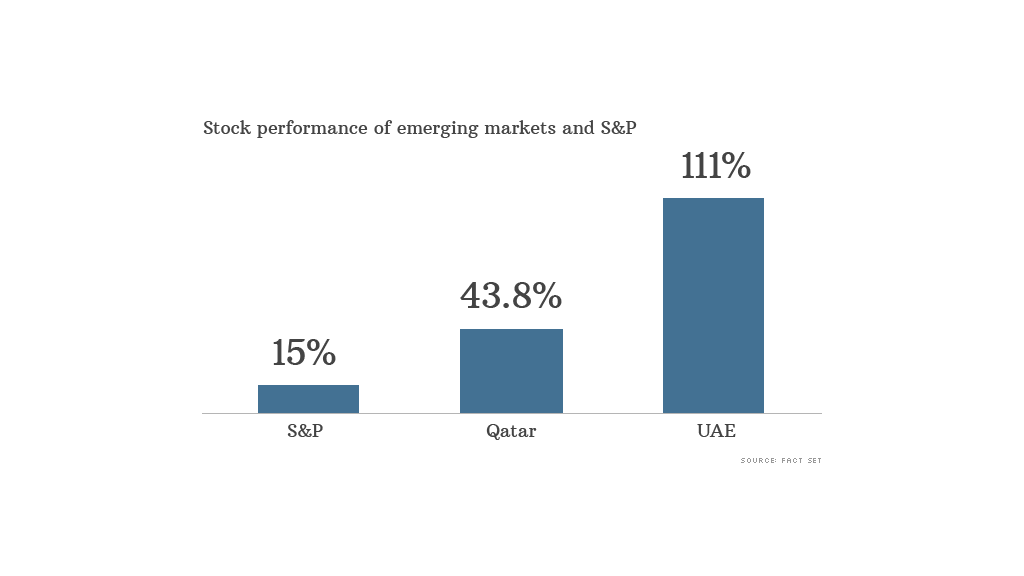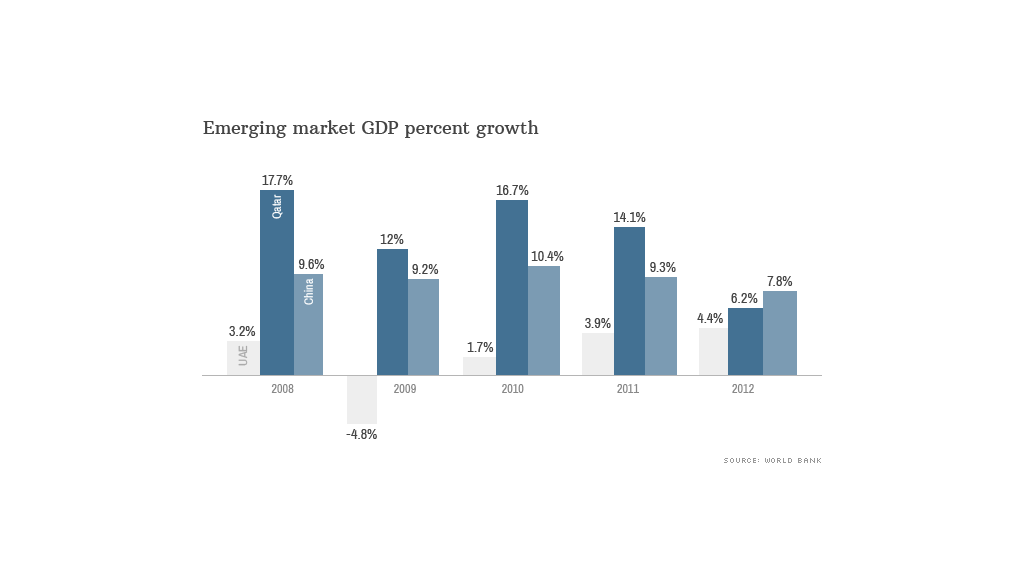
Think of Qatar and what probably comes to mind is the 2022 World Cup. For the United Arab Emirates, many Westerners likely think of Dubai, the world's tallest building or the setting for the film "Sex and the City 2".
But these two Persian Gulf countries are starting to make a name for themselves for their economies and stock markets.
Both countries will soon be upgraded to "emerging market" status, a step up from their classification as "frontier markets," a demarcation that's not too far off from the Wild West of the investing world.
The change in status by the MSCI will put Qatar and the UAE in the same league as countries like China and Brazil. It will also likely increase the flow of American investment dollars into these Gulf states.
Related: World Cup: Meet soccer's 10 biggest stars
Why does it matter?
When an organization like the MSCI shifts a country between the frontier and emerging categories, it's like a real estate agent tagging a neighborhood as hip or up-and-coming.
"There's this anticipation that more people will be interested in these stocks," said MorningStar senior fund analyst Patricia Oey of the change.
The MSCI unveiled the upgrades for Qatar and the UAE a year ago, but the official switch is expected to take place in June.
Investors who put money into funds that track the popular MSCI Emerging Markets Index are likely to own more stocks from these Gulf states soon.
Related: Investors dip a toe back into emerging markets
The Gulf state growth story
Between 2008 and 2012, Qatar saw its GDP grow an astounding 86%, according to the World Bank, rocketing past other frontier nations like Nigeria and Saudi Arabia. The UAE's economy has grown more modestly over the same period, although still twice as quickly as the U.S.

Additionally, the index move announcement last year is part of the reason both nations' stock markets have had such impressive gains. The Qatar Exchange Index is up 44% over the last year, and the UAE's Dubai Financial Market General Index has more than doubled.
Compare that to the S&P 500, a popular American stock market index. It's up 15% in the last 12 months.
Bigger fish, smaller pond
The trick for Qatar and the UAE will be to keep the excitement -- and growth -- up to draw investors when they stop being the big fish of the frontier markets pond. Now these two Gulf states will be in the "big leagues".
Investors looking for emerging markets exposure tend to focus on economies like China. In a research note, Oey noted that companies in Qatar and the UAE might only get 1% of the popular emerging market index's weight allocation.
That said, 1% of a larger pie could still leave the Gulf states better off. Around $1.4 trillion is invested in the funds that mimic the MSCI's Emerging Markets Index. That dwarfs the funds tied to the MSCI Frontier Markets Index by a factor of 100.
A word of caution
Keep in mind, however, that the impressive gains in many emerging markets are due in part to risk-chasing "hot money" driven by foreign investors seeking higher yields on their investments. What goes up can quickly go down -- dramatically.
When former Federal Reserve Chairman Ben Bernanke unexpectedly announced last May that the Fed would soon begin winding down its bond-buying program, Brazil's stock market fell nearly 20% over the next two months.
Another risk is that the fortunes of both countries are closely intertwined with energy prices, specifically oil. Energy and financial firms are big players in both economies.
Tarun Khanna, a Harvard professor who co-authored Winning in Emerging Markets: A Road Map for Strategy and Execution, said that the hope for Qatar, the UAE and other emerging markets countries is that the hot money subsides over time as investors get more comfortable with their underlying economies.
"In the longer run, I would say the real fundamentals on the ground are the primary drivers," he said.


